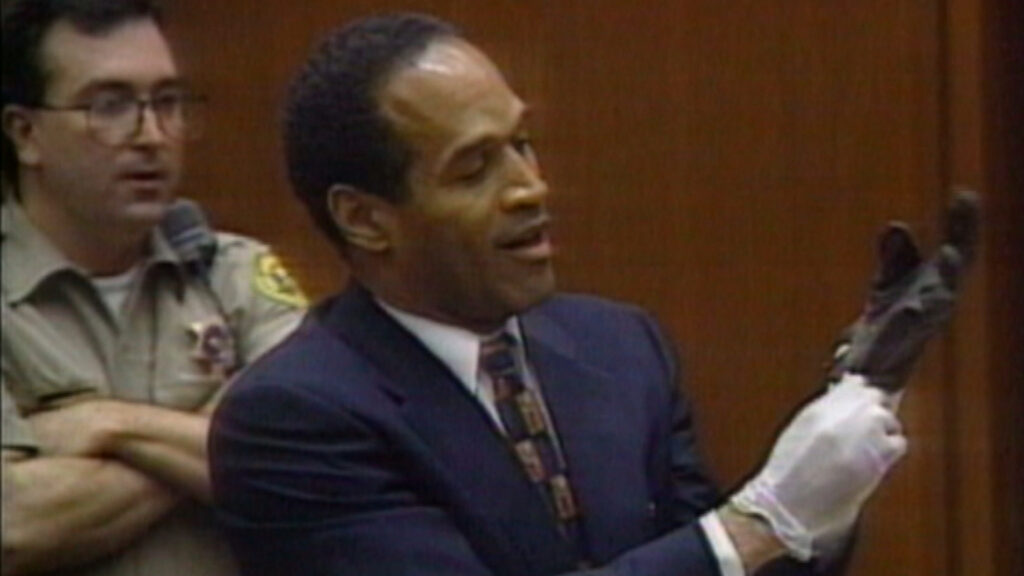“If the Glove Doesn’t Fit, You Must Acquit” is a phrase famously uttered by defense attorney Johnnie Cochran during the O.J. Simpson trial when the glove found at the crime scene did not fit Simpson’s hand.
This statement was used to argue that Simpson could not have committed the crime if the glove did not fit him. The trial garnered widespread media attention and became a significant moment in legal history. The phrase has since become a cultural reference, symbolizing the use of clever rhetoric and manipulation in legal cases.
It highlights the power of language and argumentation in shaping public perception and legal outcomes. The Simpson trial and the impact of this phrase continue to be a subject of study and discussion in the legal and media fields. The phrase “If the Glove Doesn’t Fit, You Must Acquit” became a rallying cry for Simpson’s defense team and a symbol of the power of persuasive language in the courtroom. Its impact on the outcome of the trial and its enduring place in popular culture make it a fascinating case study in legal and media history.

Credit: www.azcentral.com
The O.j. Simpson Murder Trial
The O. J. Simpson Murder Trial, famously known for the phrase “If the glove doesn’t fit, you must acquit,” captivated the nation in the mid-1990s. The trial of the former football star for the murders of Nicole Brown Simpson and Ronald Goldman became a cultural phenomenon, marked by dramatic courtroom moments and intense media scrutiny.
The O.J. Simpson murder trial remains one of the most infamous and highly publicized criminal cases in American history. The trial, which took place between 1994 and 1995, captivated the nation and the world, raising essential issues related to race, celebrity, and the judicial system. Throughout the trial, the phrase “If the glove doesn’t fit, you must acquit” became a catchphrase and a symbol of the trial’s dramatic twists and turns.O.j. Simpson’s High-profile Case
O.J. Simpson, a former professional football player and beloved actor, was accused of the brutal murders of his ex-wife, Nicole Brown Simpson, and her friend, Ronald Goldman. The case garnered intense media attention due to Simpson’s celebrity status and the shocking nature of the crimes. The trial quickly became a cultural phenomenon, shining a spotlight on the issues of domestic violence, racial tensions, and the complexities of the criminal justice system.The Infamous Glove Incident
The pivotal moment of the trial came during the “glove incident,” which occurred when Simpson tried on a bloodstained glove discovered at the crime scene. In a dramatic courtroom demonstration, Simpson struggled to fit his hand into the glove, leading his defense attorney, Johnny Cochran, to declare, “If it doesn’t fit, you must acquit.” This moment became iconic and had a significant impact on the outcome of the trial.The glove incident became a symbol of the defense’s argument that Simpson had been framed and ultimately played a crucial role in the jury’s decision to acquit him of the charges. The trial’s verdict continues to be a subject of debate and fascination, marking a watershed moment in American legal history.The O.J. Simpson trial was a landmark case that exposed deep societal divisions and raised critical questions about race, fame, and the flaws of the criminal justice system. The notoriety of the trial endures, continuing to spark discussions and scrutiny of its legal proceedings and cultural impact.Media Sensationalism
Media sensationalism plays a significant role in shaping public opinion, especially in high-profile legal cases. The phrase “If the Glove Doesn’t Fit You Must Acquit” became a media sensation during the O.J. Simpson trial, sparking intense public interest and controversy. Let’s delve into the legal implications and how media sensationalism impacted this iconic case.
Legal Implications
The public relations tactics and media coverage surrounding the O.J. Simpson trial had a profound impact on the legal proceedings. High-profile cases often become sensationalized by the media, leading to biased narratives and public scrutiny. The constant media scrutiny influenced jury perceptions and created a challenging environment for fair and unbiased legal proceedings.
Impact On Legal Proceedings
The media’s relentless coverage of the O.J. Simpson trial contributed to public divisiveness and may have influenced the legal outcome. This case epitomizes how media sensationalism can overshadow the fundamental principles of a fair trial, potentially impacting the justice system’s integrity and objectivity.
Celebrity Influence
In the high-stakes world of celebrity influence, the mantra “If the Glove Doesn’t Fit, You Must Acquit” has captured the attention of millions with its intriguing connection to one of the most infamous trials in American history. But how does the influence of celebrities impact the perception of this famous mantra? Let’s take a closer look at the unraveling truth and the significant effects of celebrity influence.
Unraveling The Truth
Amidst the sensationalized trial of O.J. Simpson in the mid-90s, one phrase stood out above all the others: “If the Glove Doesn’t Fit, You Must Acquit.” This phrase, which originated from the defense team’s argument, became a media sensation and a symbol of the trial itself. The intense media coverage, combined with the already high-profile nature of the case, resulted in widespread public awareness and influence.
Celebrities played a significant role in shaping public perception and understanding of the trial. With high-profile figures in the entertainment industry expressing their opinions and reactions to the trial, the mantra “If the Glove Doesn’t Fit, You Must Acquit” became embedded in the public consciousness. The influence of celebrities in shaping public opinion cannot be overstated, as their opinions and actions carry significant weight in the eyes of the public.
Frequently Asked Questions Of If The Glove Doesn’t Fit You Must Acquit
What Is The Significance Of “if The Glove Doesn’t Fit You Must Acquit”?
The phrase refers to the O. J. Simpson trial and reflects how crucial evidence and storytelling are to legal cases. It underscores the impact of visuals and storytelling in legal arguments and public opinion. The phrase is a powerful reminder of the influence of perception in high-profile cases.
How Did The Glove Become A Symbolic Element In The Trial?
The glove’s fitting (or lack thereof) on O. J. Simpson’s hand became a pivotal moment in the trial. It highlighted the prosecution’s reliance on physical evidence and the defense’s ability to cast doubt on its validity. This pivotal event contributed to public debate and perceptions of the case’s outcome.
Why Does The Phrase “if The Glove Doesn’t Fit, You Must Acquit” Remain Relevant?
The phrase’s ongoing relevance lies in its association with high-profile legal cases, emphasizing the impact of public perception and storytelling in legal proceedings. It serves as a powerful example of how public opinion can shape legal outcomes and the enduring impact of media coverage on significant trials.
Conclusion
After exploring the importance of gloves in the O. J. Simpson case, it’s clear that their fit played a crucial role in shaping the outcome. The phrase “If the glove doesn’t fit, you must acquit” has become synonymous with the power of visual evidence.
In high-stakes situations, the tiniest details can make or break a case, highlighting the need for thorough investigation and analysis. This case serves as a reminder of the impact of perception and the complexities of the judicial system.



